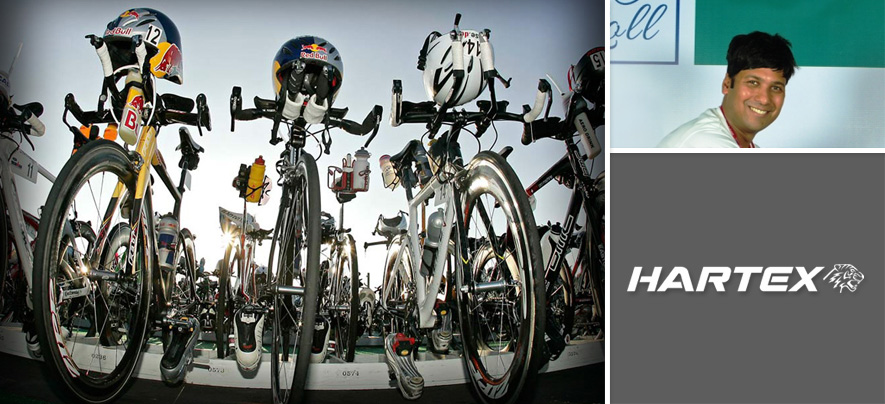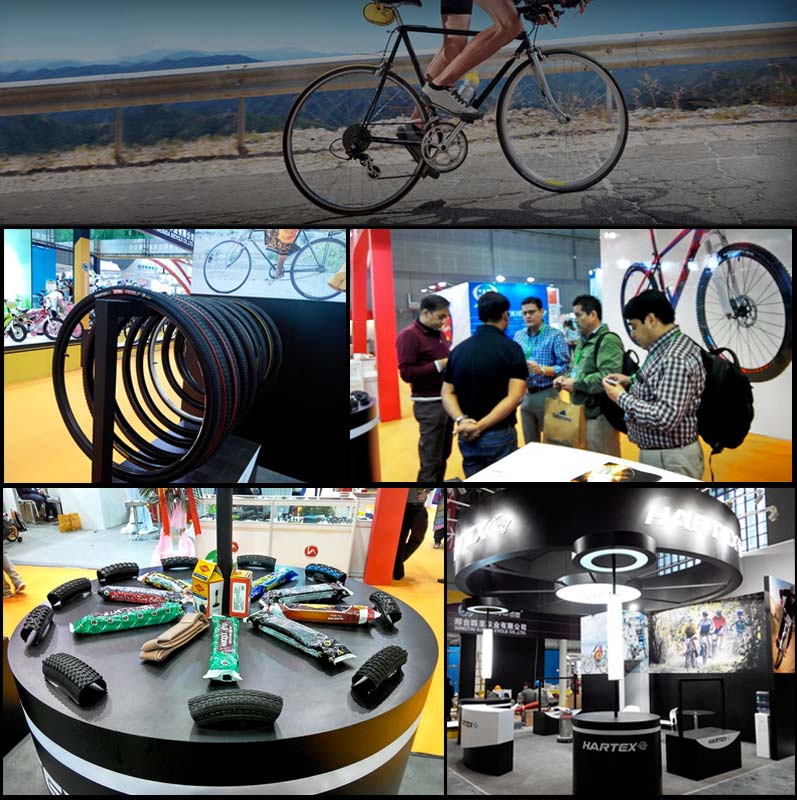Varun Sureka: Small Businesses In India Will Benefit From Being More Professional, Process-Oriented & Compliant

SME Inspirations
487 week ago — 13 min read
Varun Sureka, Director, Hartex Rubber Pvt Ltd, Hyderabad
While businesses are termed as small and medium, their dreams and aspirations are anything but small and medium. This is exemplified by Hyderabad-based third generation entrepreneur, Varun Sureka, Director of Hartex Rubber Pvt Ltd – one of the largest manufacturers of bicycle tyres and tubes in India for over five decades and a Sureka Group company.
A family-run business that started in 1961 in Kolkata, the Hartex family today operates 45 offices and two factories with a worker strength of around 1,800; a staff strength of more than 400 and a dealer network that exceeds 6,000 in India. Hartex also exports to international markets including Africa and parts of Central & South America. Additionally, the Sureka Group has also been developing real estate through various independent and consortium projects across Kolkata with some recent forays into Odisha, Telangana and Colombo, Sri Lanka.
Varun has completed his undergraduate studies from the Huntsman Program in International Studies & Business at the University of Pennsylvania, earning a Bachelor of Arts in International Studies from the College of Arts & Sciences and a Bachelor of Science in Economics from the Wharton School.
GlobalLinker (GL) spoke to Varun Sureka (VS) about his experience and learnings from running a successful third generation, global business.
Excerpts from the interview.
GL: When did you join your family business & what has been your journey with the organisation?
VS: I joined my family business in 2007 and my focus has been to systemise and to bring the organisation to a level of professionalism, where it’s not so much owner driven in terms of its day-to-day management. As a company that has been around for 50 years – there is obviously an in-built culture, which takes time to change. I started by looking into departments where we didn’t have domain experts within the family (operations, legal, HR, etc.) and simply tried to apply some combination of common sense, my limited experience from my education and work experience in the US to solve problems. I am presently involved in overseeing every department in the organisation although I don’t have a single executive responsibility on a day-to-day basis.
Last week, we concluded a 26-acre land purchase for our new factory in Punjab. We will be setting up a new factory after 28 years and that’s a legacy that I hope to leave behind for generations that come after me. Our aim is to establish a best-in-class factory in our industry by global standards.
GL: What cultural changes have you sought to bring to the company?
VS: When I joined the company and started attending meetings, I noticed that our team was quite deferential to my father. Even when he asked people for their opinions, they preferred to share it with him one-on-one, rather than in meetings. This meant that he had to play the role of filtering opinions and centralising ideas to drive a lot of decision-making. I thought that is a lot of responsibility for one person to have. I have tried to encourage a lot of open conversations and debates within the organisation. The result is more ideas, lesser back and forth outside meetings, not to mention more ownership amongst team members, because they feel they have contributed to the project rather than having merely executed orders. This has helped build a culture of transparency and accountability. Sometimes in open discussions, the best ideas come from people who are present but not involved in the particular situation, because they can be objective. Of course, the actual decision-maker has complete autonomy over whether they accept the idea or not, and they usually do.
Another thing we have been able to do is put a lot of basic systems in place with HR processes. We review job descriptions, key result areas, key performance indicators annually, which have given people more clarity on what their roles really are. Earlier the system was based on oral instructions, especially at junior levels. Now, with clearly defined parameters we are able to track individual performances better. We have been able to implement a component of variable pay and award high performers accordingly.
These people draw motivation from the fact that they have been recognised and other team members realise that they too can perform and earn rewards. It was a little uncomfortable when we started doing this because people were not used to this level of open discussion about their strengths, weaknesses and overall performance. We had a bit of a shakeout and few people left but many have returned to the company since then. Finally, we are continuously reviewing policies across departments and working on simplifying and standardising them to minimise administrative cost and maximise fairness (especially in HR policies).
GL: What measures has your organisation taken to be a successful global player?
VS: The business was already global when I joined the company – we were exporting to Africa and parts of Latin America. I presently interface with all our export customers only to drive new product development and am generally accessible for troubleshooting. I particularly handle all business dealings where our customers don’t speak English. While I get to use my French regularly with francophone Africa, prospective customers in Latin America usually laugh at my Spanish, which is a great icebreaker. Since we typically work with one partner/entrepreneur in each country, we like to know them well and they like to know that we are involved and available. The new factory will hopefully cater to the developed world in addition to the existing markets. We hope to be operational by the end of FY 2016-17 and we hope to be a truly global company with a presence in all continents a few years down the road.
To address challenges of labour availability and productivity, we have taken a principled and long-term approach in interacting with our recognised union. As a result, they find us to be responsive and fair and there is continued harmonious working in the factories. We are now a lot more compliant with regards to all statutory norms and are working towards tightening our preventive maintenance schedules. All this leads to lesser fire-fighting, higher levels of capacity utilisation, improved output, greater quality consistency and product reliability. As a result of that we are able to compete in a lot more scenarios than we were earlier and our delivery cycle is more in our control.
GL: What are some of your learnings in business?
VS: The organisation will speak the language that the promoters speak and the organisation will be confused if family members say one thing today and another tomorrow, or if they don’t speak the same language amongst themselves. I believe that one of the first things that any organisation, especially a family-owned business, should agree on is a common set of principles and a common vision, mission and values. All of the above need to be communicated within the organisation and then team members should in turn reflect these ideas and values in their communication – whether it be with suppliers, partners, customers or any other stakeholder.
I also believe that ‘people don’t leave their jobs, they leave their bosses’. I try to be honest and fair when I interact with the people around me. Another thing I have learnt is that when you do business, you tend to impose your culture on the other culture, without necessarily understanding what that culture is all about. The way you do business in export markets may be entirely different from business in India.
Across Latin America, the Middle East and the Far East, there is a need to develop a relationship since these are high-context cultures. Business is not as transactional as one would expect in perhaps say Germany or the US, which are low-context cultures. You have to be willing to change the way you operate to suit your customer’s need.
GL: What are the pros & cons of being part of a family-run business?
VS: The advantage is that you can be the change that you want to see in the organisation. If you are empowered, have a good working relationship with your family and have a clear demarcation of roles amongst family members, then you can really effect some positive changes. You can shape the way the organisation grows. I had a bird’s eye view of the organisation at a very young age. I was an M&A investment banker at Credit Suisse, New York before I came back to work in the family business. My role there was very transactional. You have a micro-view in the grand scheme of things at an investment bank. But even if your family business is smaller, once you are involved in a leadership role, you have a broader perspective.
A minor con is that in a family business you are constantly wearing different hats. When I started working in the organisation my father told me on my first day, “I don’t know how to train you. You have got to figure out your training programme for yourself.” And I spent time handling pretty much everything in the organisation. So one day it was operations, then next day it was human resources, the third day it was some legal work, and so on. However, it turned out to be a blessing in disguise, because you get used to multi-tasking. Plus, I realised that departments are great at working within themselves but interdepartmental communication is not always smooth. We are working on improving this area.
GL: What is your message to aspiring entrepreneurs?
VS: If you are an aspiring entrepreneur, the only thing I can say is don’t let the word ‘No’ get to you. People will resist new ideas and nobody is going to do your work for you. Let your passion and perseverance guide you. For young businesses, the cash burn rate is arguably one of the most critical things to monitor. Not every business will receive an outsized market valuation so don’t bank on it.
SMEs are the backbone of industry in India, even though we are countless small cogs in the giant wheel. But at the end of the day, there is real value created in every business - one has to just remember what that is and keep working on expanding that value proposition. For the existing entrepreneur, the challenge is to actually get away from day-to-day operation so you can think about growth. It’s quite hard to think big if you’re too busy dealing with nitpicky issues or if you need to micromanage some small operation in your business. I always try to remember that when figuring out how to allocate my time in office.
On a slightly different note: from my interactions in various industry forums, I find there are a lot of business-owners who feel that compliance is not important, they feel that “aaj ka dekhte hain, kal ka dekha jayega bad mein” (let’s focus on today, we will worry about tomorrow later). That is a very tricky road to go down. The regulatory environment is evolving rapidly in India and it will be a lot easier/cheaper to comply today than tomorrow. If your industry has some statutory requirements, please monitor them, because a lot of international companies care not only about the quality of products but also about how the organisation is run. If you want to compete internationally, you have got to check all the boxes - even in terms of social compliance in many cases.
Varun Sureka is one of the many business owners to access the big business advantage on GlobalLinker.
Disclaimer: This article is based solely on the inputs shared by the featured member. GlobalLinker does not necessarily endorse the views, opinions & facts stated by the member.

Posted by
GlobalLinker StaffWe are a team of experienced industry professionals committed to sharing our knowledge and skills with small & medium enterprises.
Network with SMEs mentioned in this article
View GlobalLinker 's profile
Most read this week










Comments (1)
Share this content
Please login or Register to join the discussion